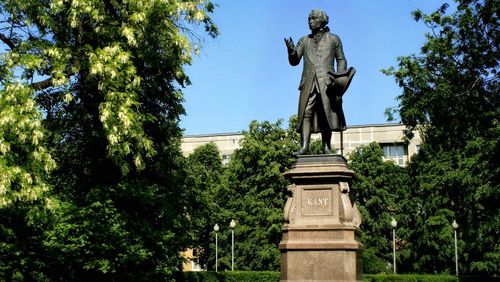When Adorno's "Minima Moralia" were published little more than 70 years ago, it was a sensation. No other intellectual had ever delieverd such an excoritating critique of the desolate state of modern society. Reason enough to reread the Frankfurt-born philosophers' scintillating aphorisms, plead Helena Esther Grass and Peter Neumann.
There are not many philosophical classics that enjoy cult status. Theodor W. Adorno’s Minima Moralia, a collection of aphorisms published in 1951, is one such book, even if its author would probably have been less than delighted by its popular appeal. Adorno was not interested in pleasing people. And yet only a few years after the war his Reflections from a Damaged Life, as the book is subtitled, became compulsory reading in intellectual circles, precisely because of the outrageous tone of the thinking behind it, that refused to continue to be corrupted by the thoroughly false morals of bourgeois society and instead exposed it with zeal.
The book’s 153 aphorisms testify to just how ‘damaged’ life in the mid-twentieth century was. Listed under such evocative yet mysterious sounding key terms as “Grassy seat”, “Princess Lizard” and “Tough Baby”, Minima Moralia was a collection of highly distilled micro-reflections in which individual, often seemingly trivial accounts of experiences in everyday life, film, the advertising industry and design suddenly flare up under the magnifying glass of critical theory to symbolize an entire epoch. From totalitarianism to the cultural industry or capitalist consumerism, Adorno senses a dangerous and all-pervading tendency towards a total hollowing out of meaning which renders the prospects for humanity and individual happiness deeply precarious. Whatever may once have been good and decent about the bourgeoisie, in Adorno’s diagnosis, is now rotten to the core.
One reason for the enduring fascination with Minima Moralia is undoubtedly its literary form. Schooled in the aphoristic art of Friedrich Nietzsche and the fragments of early Romanticism inspired by the biting satire of Karl Kraus, Adorno eschewed the traditional form of the philosophical treatise and embarked on his very own path of poetic thought. The power of Adorno’s aphorisms lies not in the meticulously plotted argument, but rather in the fleeting glimpses of things that cannot be captured by concepts, let alone contained in statements of unwavering validity. And just as the early Romantic poet Friedrich Schlegel around 1800 had defended “incomprehensibility” against an Enlightenment overly confident of its triumphs, Adorno now turned to a society trapped in the eternal cycles of bourgeois-capitalist rationality and declared: “Only that which they do not need to know counts as understandable”.
Minima Moralia took a long time to be published. Seven years passed between Adorno penning the initial sketches in his diary and the publication of the book, and his reflections were unusually sharp in tone. Aloof, bitter, often disdainful. Many of his early readers not only considered the book too difficult but were also repelled by its open display of moral superiority. Thomas Mann, who shortly after the end of the war warmly recommended the book to his publisher Gottfried Bermann-Fischer in New York, suddenly distanced himself a few months later from his fellow émigré neighbour in California, who had provided him with such invaluable insights into music theory while he was working on Doctor Faustus. While Mann never stopped supporting Adorno's efforts to publish the work, he now criticised the book as “vitriolic, overly caustic, overly intellectual”. Bermann-Fischer was also unable to overcome his dislike of Adorno’s “extreme cleverness”. The manuscript remained shut away in a drawer, its explosive intellectual power initially unrecognized.
When the collection of aphorisms was finally published by the newly founded Suhrkamp Verlag, it was the book of the hour, and Adorno the philosophical media star of a young federal republic on the path to self-discovery. For a generation coming of age, the aphorisms provided the intellectual tools to articulate a stinging critique of the spiritual destitution into which the German post-war public had manoeuvred itself. Bourgeois society, which had not only not prevented National Socialism but had actually abetted and even enabled it, was in the process of re-establishing a foothold. Adorno’s book was a loud and clearly audible warning against sleepwalking into a false sense of security.
"The only true thoughts are those, which do not understand themselves"
Minima Moralia refused to comply with people’s desire to draw a line under the past. Adorno called attention to the patterns of experience that had not only led to the Zivilisationsbruch (civilizational rupture) of Auschwitz but which, after the war, were still firmly entrenched in the society of the Adenauer republic. For Adorno, any talk of an historical zero hour, of a new beginning after 1945 was out of the question. Even a stringent de-Nazification process, he made it very clear, would change nothing. For Adorno, processing the past meant returning time and again to the “suffering” which words could never even come close to describing adequately. “The only true thoughts are those, which do not understand themselves,” one of his aphorisms professes. Any reference to the past must also speak to that which has not been processed and which is part of the life history of every individual.
Captivating and merciless in equal parts, over the years this denunciation of the odious self-satisfaction of the West German economic miracle society made of Adorno, who returned to Germany in 1949 and set about rebuilding the Institute for Social Research in Frankfurt, a source of inspiration for the social protest movement that came to a head in the generation of ‘68 in the US and Europe. Adorno’s central slogan – there is no right life in the wrong life – came to have very real consequences, even though he himself remained troubled by the student revolts to the end. As much understanding as he had for the motives of the protest, Adorno regarded any militant action taken by the demonstrators as just another form of totalitarian violence. As Adorno commented in an interview shortly before his death, he had set up a theoretical model, how was he to know that people would seek to realize it using Molotov cocktails? What he was interested in had nothing to do with violent action.
At the heart of the Minima Moralia is a critique of the Enlightenment. This links it with Adorno’s earlier work, Dialectic of Enlightenment, published in 1947. Because one of the core arguments put forward by both Adorno and his congenial colleague Max Horkheimer was that in showing no restraint in its thirst for validity nor restricting itself to particular fields of knowledge, Enlightenment has a tendency to mutate into its opposite: mythology. It becomes a blind, domineering force that quashes its own emancipatory potential. Until all that remains of the Enlightenment’s promise to liberate humanity is an endless incremental logic of techno-scientific thinking which not only deprives reason of the space to develop, but lulls it into a false belief in its own freedom. History becomes our doom. Which is why we are called upon to intervene.
His critique is ambiguous in that it clings to the promise of the Enlightenment even as it tries to save it from becoming a perversion of itself. Adorno argues that the Enlightenment, the ability to think for oneself, must be rescued from its exaggerated claims and fatal self-deceptions, which can all be traced back to its origins in antiquity. After the moral catastrophe of Auschwitz, more Enlightenment rather than less was needed to prevent something similar from ever happening again.
It is when we look behind the criticism of the Enlightenment’s blinkered belief in progress, however, that the real target of the Minima Moralia emerges. Adorno’s ‘small ethics’ essentially questions whether in the hyper rationalized modern age it is possible even to still speak of a ‘right life’ when the social framework arrests the proper development of social freedom. Adorno laments that what was once known as ‘life’ has been utterly corrupted by the magic of the modern commodity world. Whereas in antiquity the ‘good life’ was universally regarded by philosophical thought as the ‘greatest good’, today it has been trampled flat by an obsession with reification that has permeated all areas of life. Adorno's most urgent question is this: whether and how ‘life’ can succeed in a world that systematically shuts out, and in the worst case even destroys, a life worthy of the name?
The legacy of the Enlightenment is still at stake
Even today, more than thirty years after the much-proclaimed ‘end of history’, the inner connection between Enlightenment and reason, between sovereign freedom and a successful life, is once again up for debate. On the surface, life in the twenty-first century may appear anything but ‘damaged’. There can certainly be no comparison with the situation after the end of World War II. Yet the spread of Covid-19 has exposed just how porous the moral varnish of a public that considers itself enlightened really is. Authoritarian regimes and far-right parties are celebrating victories all around the world by questioning the achievements of the scientific community and deliberately ignoring or even wilfully distorting rational arguments in the name of ‘free’ thinking.
Seen in the context of these gloomy and even ominous prospects, Adorno’s reflections from a damaged life have lost nothing of their tremendous relevance even seventy years on. The legacy of the Enlightenment is still at stake. Jürgen Habermas, the successor of the critical theory founded by Adorno and Horkheimer in particular, once referred to this as “the unfinished project of modernity”. The question of where history is headed – if indeed it is headed in only one direction and at only one speed these days – is more crucial today than ever.
This guest contribution first appeared in the current issue of the research magazine EINBLICKE.

![[Translate to English:] [Translate to English:]](/fileadmin/_processed/5/2/csm_minima_moralia2_f6e10bf284.jpg)


